Welsh toy manufacturing has 'almost disappeared'
- Published
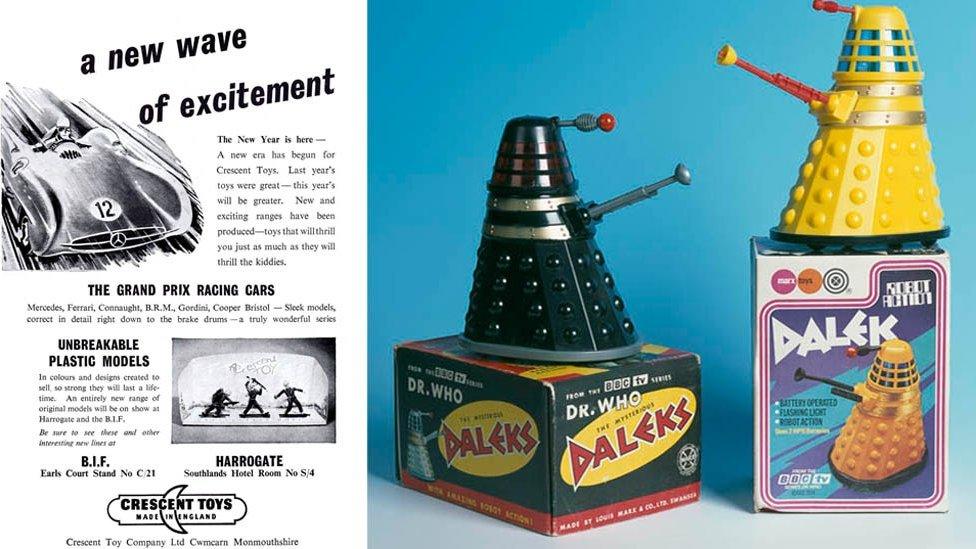
Crescent Toys (poster left) was based in Cwmcarn while Swansea-based Louis Marx made these Dalek toys
Retro toys with a twist have been tipped to help sustain the UK toy industry's recent growth in 2016. But what happened to the makers of Welsh classics - such as Corgi Cars and SuperTed - which once were part of the engine room of Britain's toy trade?
The British Toy and Hobby Association (BTHA) has said the re-launch of many old favourites will boost sales after the UK's highest growth in half a decade, last year.
However, that comes too late for the bulk of Wales' toy industry, which once employed thousands but has now "almost disappeared", according to experts.
"It's amazing how evocative a toy can be," said Hilary Kennelly, of the West Wales Museum of Childhood.
"It can transport you back to a childhood that you had even half-forgotten. Yes, toys are quite powerful."
Hilary Kennelly, of the West Wales Museum of Childhood, says children are growing up 'too fast' for toys
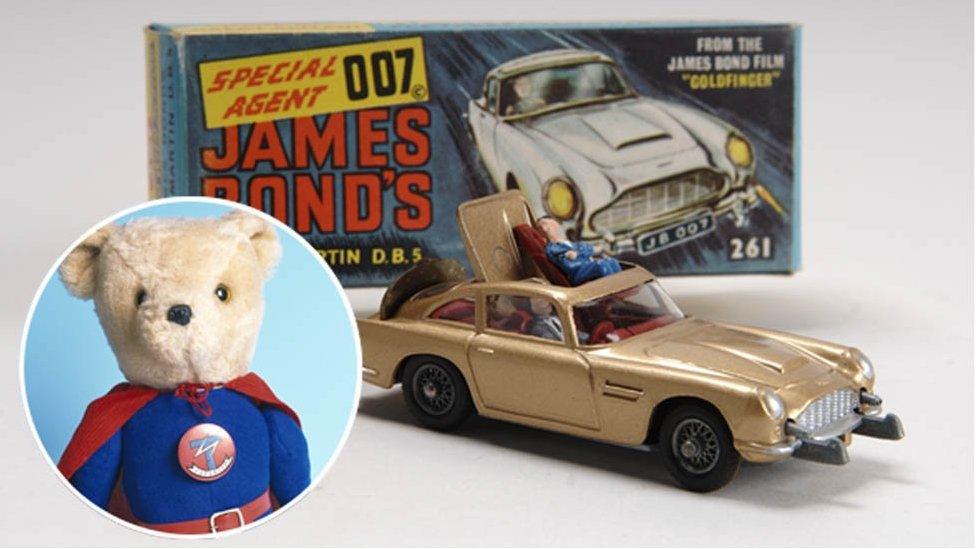
SuperTed (inset) and the famous Corgi Bond car were extremely popular
But that wistful sense of a wonderful time, now irretrievably lost, applies equally to the once-vigorous sector of factories and studios which turned out play things across Wales.
Mrs Kennelly and her husband, Paul, preside over a staggering collection of 10,000 toys at the museum in Llangeler, Carmarthenshire - many of them Welsh-made.
Describing the rise of their creators, she said: "There were so many toys needed that a lot of British firms and the occasional American firm came to Wales.
"And, of course, there was government help to set up factories.
"Especially when you had the men doing coal mining and the steel-making, you wanted something for the wives to be doing. So, a lot of toy making was actually the wives, because they had more nimble fingers."

The world's rarest Corgi car?
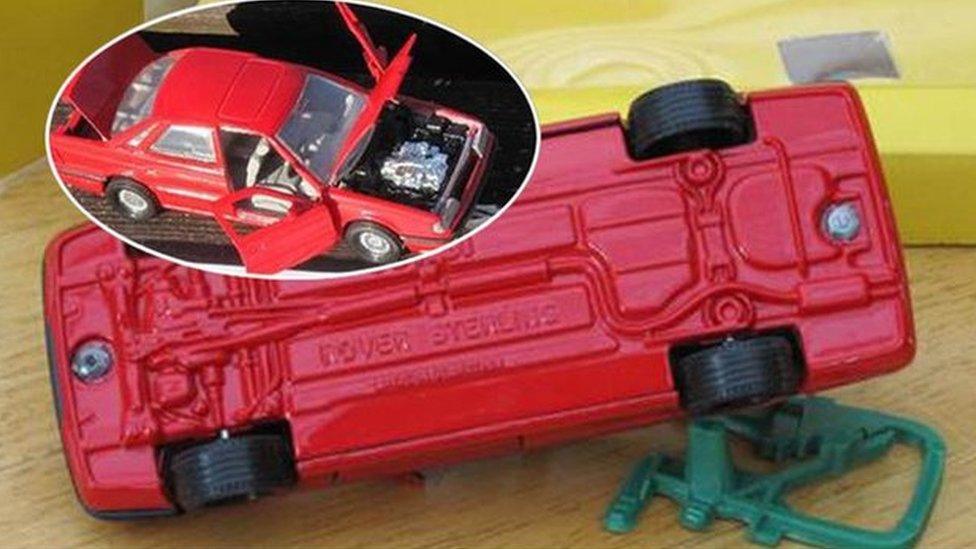
The rare red Rover Sterling was never sold by Corgi
This red Rover Sterling could be the rarest Corgi car ever to have left the firm's Swansea plant, according to Paul Kennelly of the West Wales Museum of Childhood.
He said only 12 are known to have been made, with the details of their production tantalisingly vague.
He bought them from a wholesaler who had picked them up at the Fforestfach plant as it was closing in 1991.
The Rover Sterling was only available in silk green, silver and an assortment of police designs, and he believes the dozen red prototypes were intended, not as production models, but as colour trials.
With so few of the model in existence, it has previously fetched up to £200.

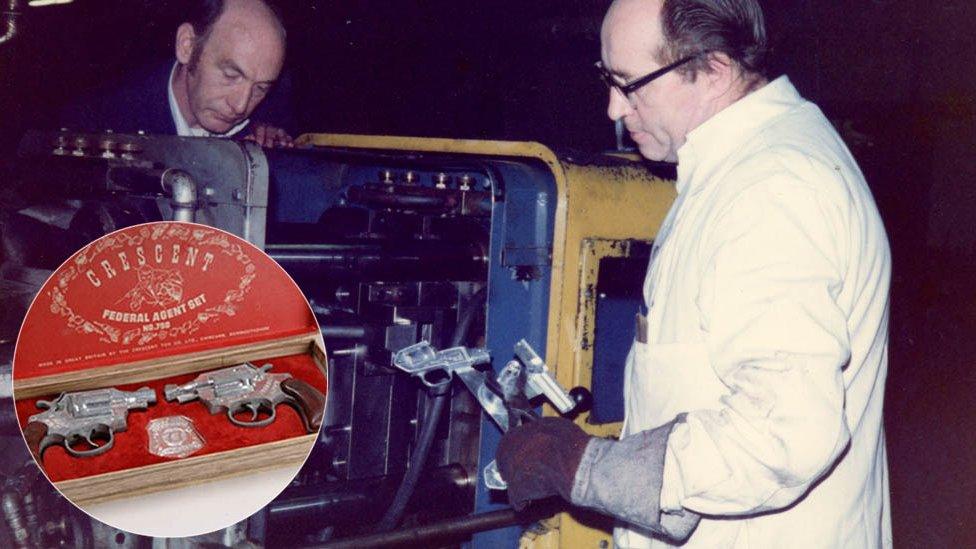
The die-cast department at Crescent Toys works on one of the firm's famous replica guns
The bulk of toy production had traditionally taken place in Germany until World War One.
"All of sudden, you couldn't be playing with 'enemy' toys," Mrs Kennelly added, explaining that caused producers to spring up in Britain.
World War Two then led to the expulsion of many Jewish manufacturers from Germany, including Mettoy, which later became Corgi Cars.
Mettoy set up in Northampton before running a subsidised plant at Fforestfach, Swansea, making, not toys, but necessities for the war effort, including jerrycans and Bren Gun clips.
But 1956 saw the release of Corgi's first toy vehicle - a Ford Consul (200/200M) - with the range going on to rapidly expand and the factory going on to employ more than 5,000 people.
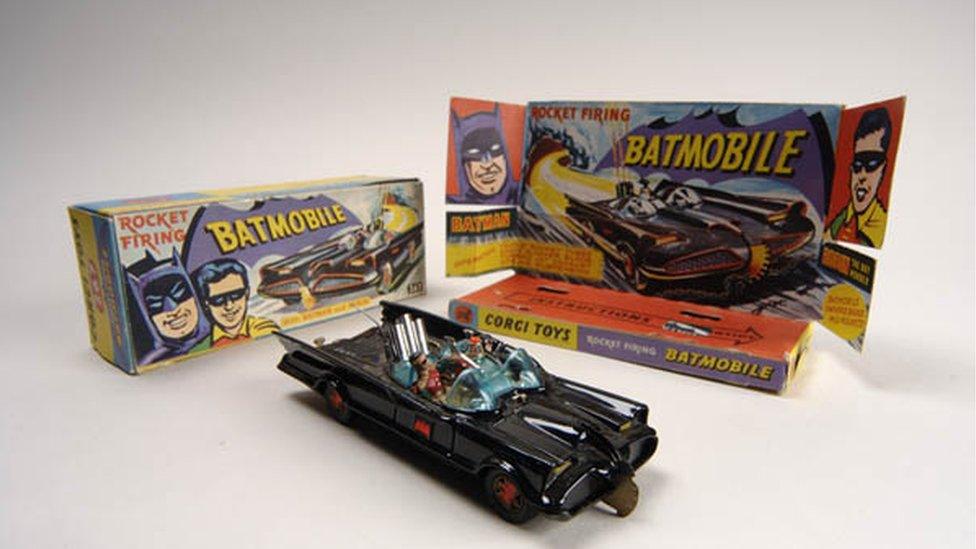
Corgi toys spawned from TV and films were big sellers
Corgi, which overshadowed any other producer in Wales, sold its miniatures all over the world, with film and TV replicas, such as the Batmobile and James Bond's Aston Martin DB5 among the most coveted.
However, it was sold to American giant Mattel in 1989 and the factory in Swansea was closed in 1991, external. After a management buyout in 1995, Corgi was then acquired by Kent-based Hornby in 2008.
"It was a very sad day when Corgi left Wales," Mrs Kennelly said.
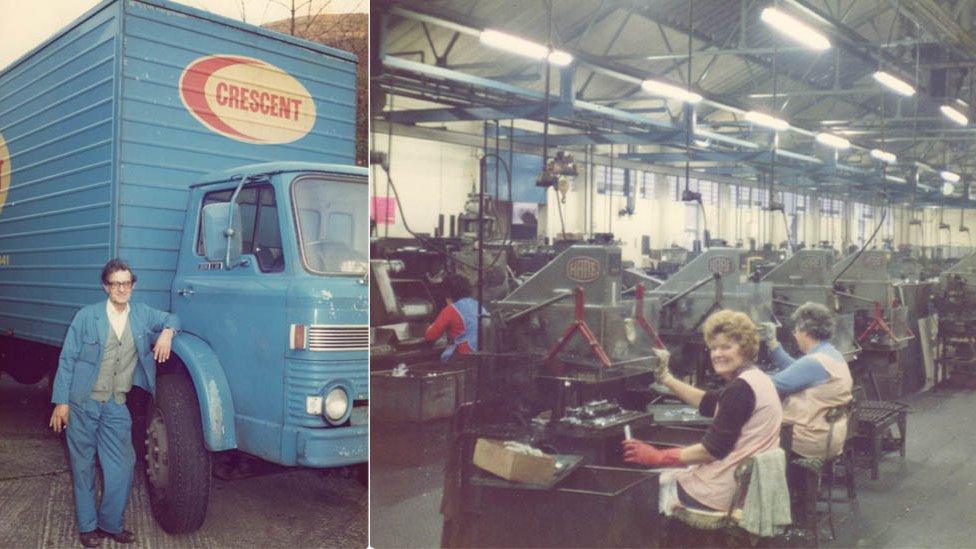
A Crescent Toys delivery driver and women working on the Cwncarn factory shop floor
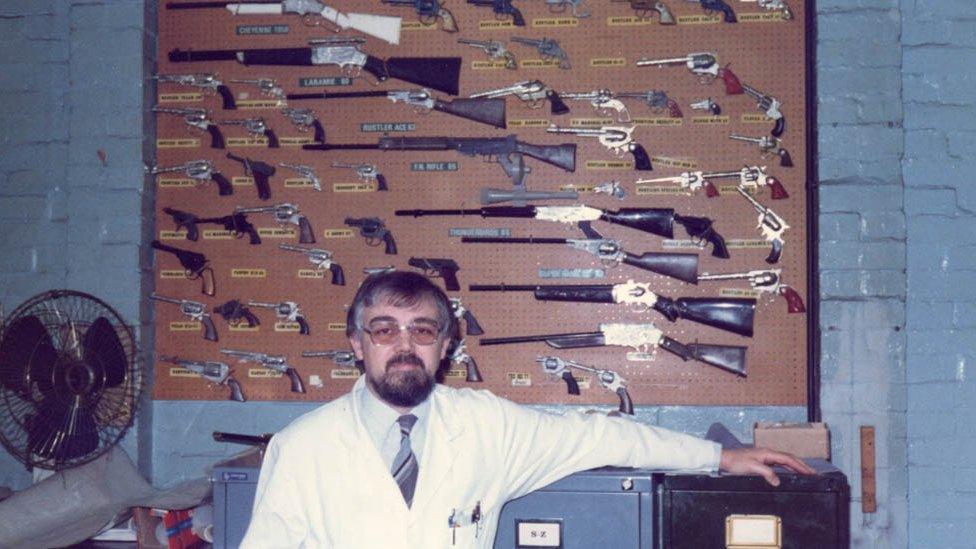
John Aldridge was chief designer at Crescent Toys, which was well-known for its cowboy guns
But at its peak, the Welsh toy-making industry was home to other large manufacturers.
Tri-ang Toys, in Merthyr Tydfil, made railways and wooden toys; Wells' Toys had a factory in Holyhead, Anglesey, and Wendy Boston Teddy Bears had premises in Abergavenny, Monmouthshire and Crickhowell, Powys.
In the 1940s the late Arthur Schneider was responsible for bringing Crescent Toys - which made cowboy guns, models and cars - from London to Cwmcarn, in Caerphilly county.
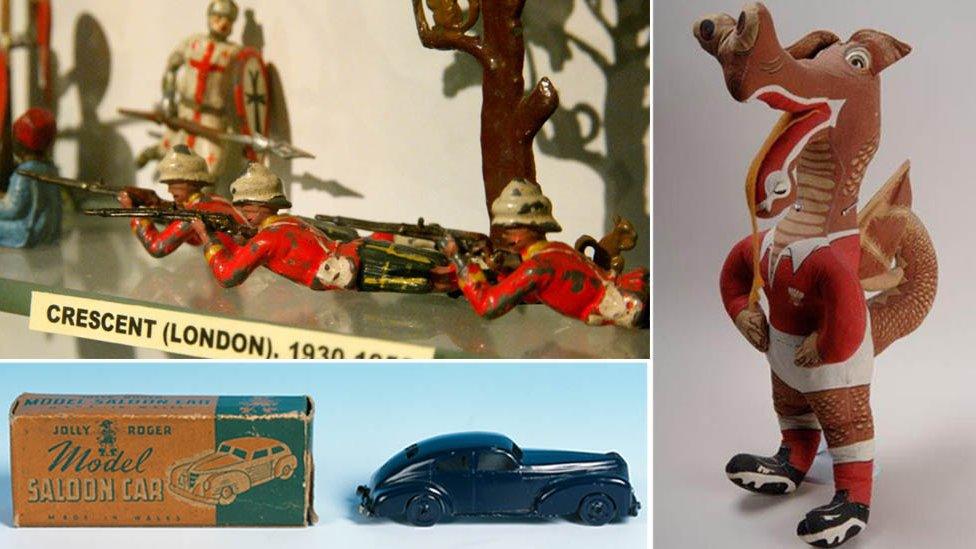
A Jolly Roger toy car, Crescent die-cast models and a Welsh rugby Mascot made by Deans, of Pontypool
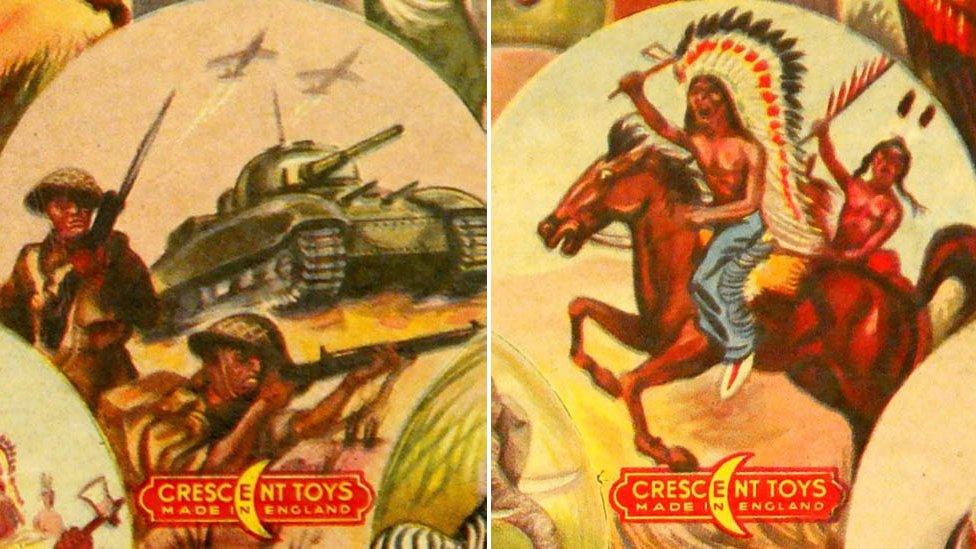
Crescent Toys moved to Wales form London in the 1940s
John Aldridge worked at the plant for about 25 years and was chief designer when it closed in 1981.
His widow, Jean, 76, of Cross Key, Caerphilly, said it was "a big factory to lose" for the area.
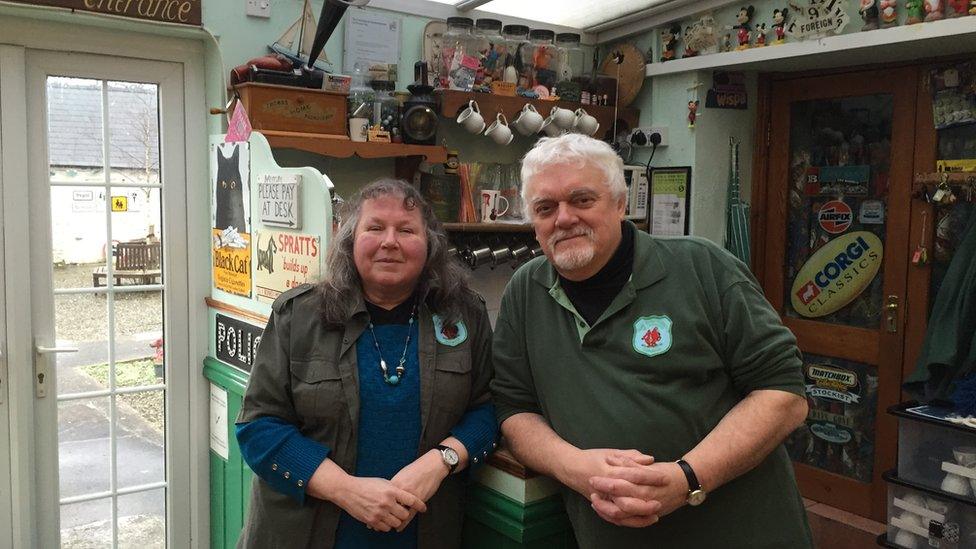
Hilary and Paul Kennelly have run the West Wales Museum of Childhood for a decade
SuperTed, the animated bear who became the first star of Welsh channel S4C and later a British staple, also spawned a successful range of soft collectables.
However, Mrs Kennelly said the Welsh toy-making industry has now "almost disappeared", adding: "There are very few firms still making things here."
Among them is The Rocking Sheep Company, in Harlech, Gwynedd, has produced a hand-made "woolly alternative" to the traditional rocking horse since 1991.
Simon Wolfers, who runs the small firm, said: "It's getting more and more difficult. You have to diversify to survive.
"I have always wanted to grow to a point, but I have never gotten to that stage. There has been recession after recession. It's been a battle."
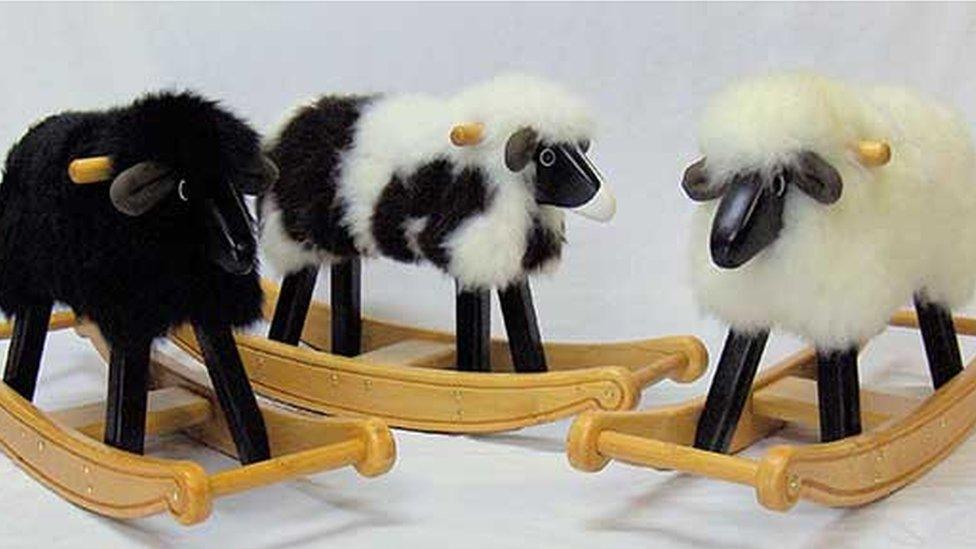
The Rocking Sheep Company's flock are made to order
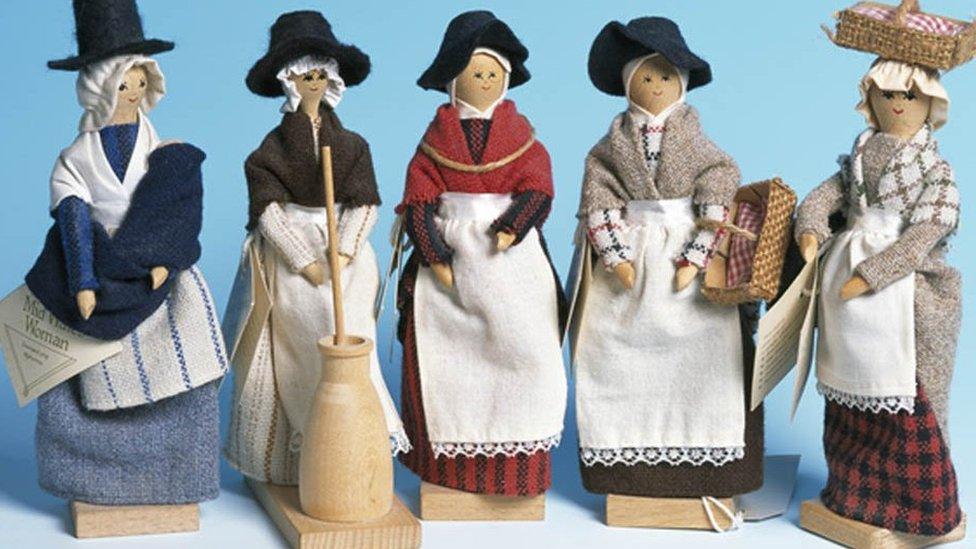
Peg dolls in traditional Welsh costume, made in Lampeter, Ceredigion
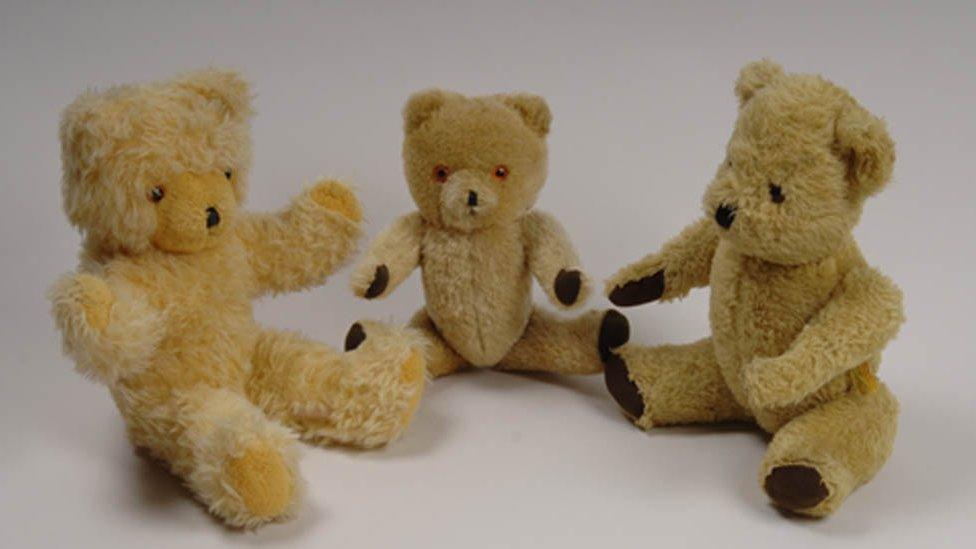
A bear (left) made by Wendy Boston Teddy Bears and two produced by Deans
But despite many Welsh producers passing into the night, thousands of collectors continue to trawl the internet for the lacuna in their cherished horde.
A search for Corgi cars alone on online auction site eBay yields more than 4,500 results.
So, why does their popularity endure, even if their creators do not?
Mrs Kennelly has a theory: "A childhood memory is a nice thing every so often."

Images by Michael Burgess
Video by Philip John